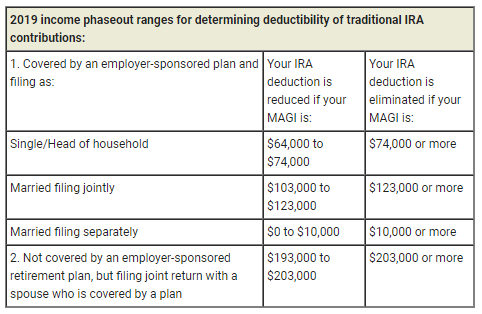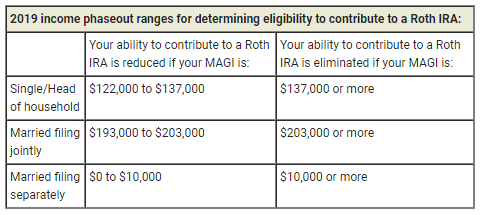There's Still Time to Contribute to an IRA for 2019
- 030420
- 2 minutes
Even though tax filing season is well under way, there's still time to make a regular IRA contribution for 2019. You have until your tax return due date (not including extensions) to contribute up to $6,000 for 2019 ($7,000 if you were age 50 or older on December 31, 2019). For most taxpayers, the contribution deadline for 2019 is April 15, 2020.
You can contribute to a traditional IRA, a Roth IRA, or both, as long as your total contributions don't exceed the annual limit (or, if less, 100% of your earned income). You may also be able to contribute to an IRA for your spouse for 2019, even if your spouse didn't have any 2019 income.
Traditional IRA
You can contribute to a traditional IRA for 2019 if you had taxable compensation and you were not age 70½ by December 31, 2019. However, if you or your spouse was covered by an employer-sponsored retirement plan in 2019, then your ability to deduct your contributions may be limited or eliminated, depending on your filing status and modified adjusted gross income (MAGI). (See table below.) Even if you can't make a deductible contribution to a traditional IRA, you can always make a nondeductible (after-tax) contribution, regardless of your income level. However, if you're eligible to contribute to a Roth IRA, in most cases you'll be better off making nondeductible contributions to a Roth, rather than making them to a traditional IRA.

Roth IRA
You can contribute to a Roth IRA even after reaching 70½ if your MAGI is within certain limits. For 2019, if you file your federal tax return as single or head of household, you can make a full Roth contribution if your income is $122,000 or less. Your maximum contribution is phased out if your income is between $122,000 and $137,000, and you can't contribute at all if your income is $137,000 or more. Similarly, if you're married and file a joint federal tax return, you can make a full Roth contribution if your income is $193,000 or less. Your contribution is phased out if your income is between $193,000 and $203,000, and you can't contribute at all if your income is $203,000 or more. And if you're married filing separately, your contribution phases out with any income over $0, and you can't contribute at all if your income is $10,000 or more.

Even if you can't make an annual contribution to a Roth IRA because of the income limits, there's an easy workaround. If you haven't yet reached age 70½, you can make a nondeductible contribution to a traditional IRA and then immediately convert that traditional IRA to a Roth IRA. Keep in mind, however, that you'll need to aggregate all traditional IRAs and SEP/SIMPLE IRAs you own — other than IRAs you've inherited — when you calculate the taxable portion of your conversion. (This is sometimes called a "back-door" Roth IRA.)
If you make a contribution — no matter how small — to a Roth IRA for 2019 by your tax return due date and it is your first Roth IRA contribution, your five-year holding period for identifying qualified distributions from all your Roth IRAs (other than inherited accounts) will start on January 1, 2019.
Finally, note that 2019 is the last tax year for which the age 70½ restriction on traditional IRA contributions applies. Due to passage of the SECURE Act in late 2019, beginning with the 2020 tax year, investors over the age of 70½ will be able to contribute to a traditional IRA provided they have compensation equal to at least the amount of the contribution (spousal IRA rules will remain in effect).
Securities offered through Lincoln Investment, Broker/Dealer, Member FINRA / SIPC. www.lincolninvestment.com Advisory Services may be offered through Beacon Financial Advisory, LLC, Lincoln Investment or Beacon Financial Advisory, Registered Investment Advisers. FNA Wealth Management, Ltd. and Beacon Financial Advisory, LLC and the above firms are independent and non-affiliated.
The Lincoln Investment Companies do not provide tax, legal, or social security claiming advice. The information presented here is not specific to any individual's personal circumstances. To the extent that this material concerns tax matters, it is not intended or written to be used, and cannot be used, by a taxpayer for the purpose of avoiding penalties that may be imposed by law. Each taxpayer should seek independent advice from a tax professional based on his or her individual circumstances. These materials are provided for general information and educational purposes based upon publicly available information from sources believed to be reliable — we cannot assure the accuracy or completeness of these materials. The information in these materials may change at any time and without notice. Diversification or asset allocation do not guarantee a profit or protect against a loss.
This communication is strictly intended for individuals residing in the state(s) of AL, AZ, CO, CT, DC, FL, ID, IL, KY, NV, NY, NC, OH, PA, SC, TN, TX, VA and WV. No offers may be made or accepted from any resident outside the specific states referenced.
Prepared by Broadridge Advisor Solutions Copyright 2020.


